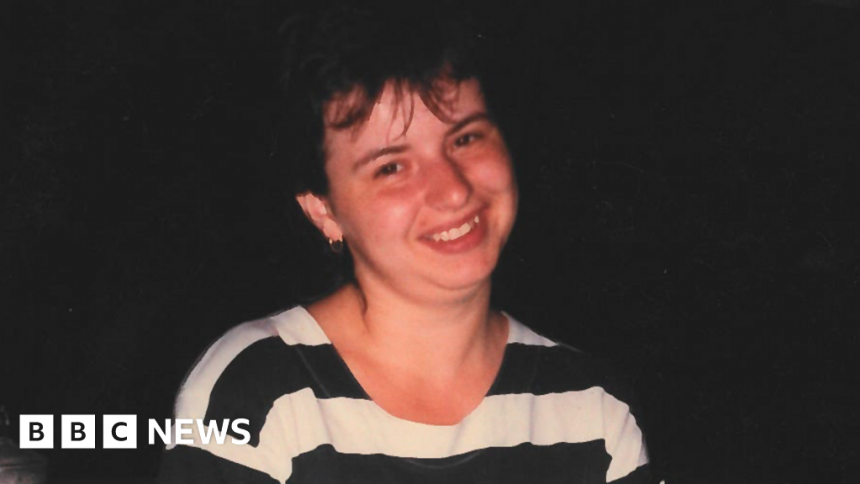‘Our fight to ensure justice for Monika’
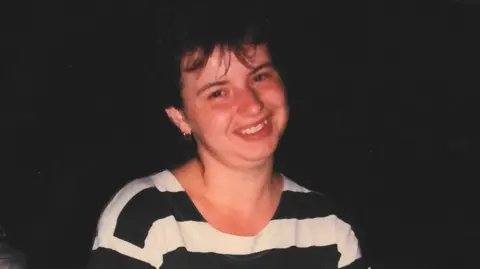 Family handout
Family handoutSix years after a drink-driver left her with catastrophic brain damage, Monika Lewandowska died. The driver had already been jailed for injuring her, but detectives pushed for him to be punished again for her death.
On a summer’s evening eight years ago, Monika’s life was destroyed in less than a second.
As she walked along one of Darlington’s terraced streets, a silver car mounted the kerb and ploughed into the back of her, smashing a hole in a living room wall in the process.
The crash was captured on CCTV, as were the shocked reactions of passers-by who rushed to her aid and tried to pull her from beneath the wrecked car.
The police officers and paramedics that fought on the pavement to save her life feared their efforts would be in vain – they did not think she could survive.
Monika defied their expectations, but her life was dramatically altered.
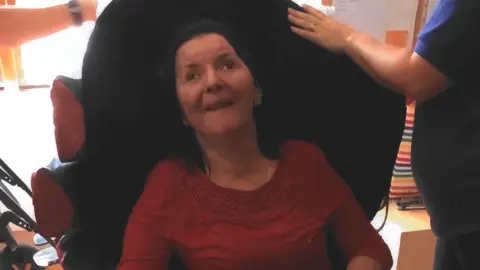 Family handout
Family handoutThe mother of two could no longer walk or talk, she was assessed to be in a “minimally conscious state” with a “reduced awareness” of what was going on, her serious injury lawyer Laura Mcilduff says.
Monika needed full-time care, her Polish carers would sing to her in her native language to stimulate her.
“Quite often Monika’s breathing would become a lot more settled, sometimes she would shed a tear when she was listening to the singing and it would really help calm her,” Laura says.
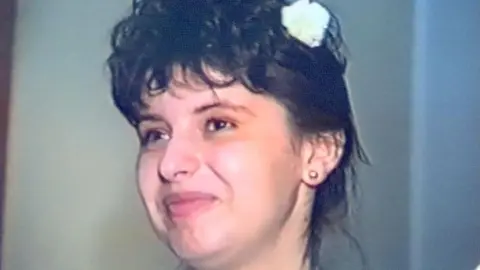 Family handout
Family handoutMonica had grown up in Łódź, an industrial city in the heart of Poland, and moved to the UK in 2013 to earn money for her two daughters.
“She was a very lovely woman,” her eldest daughter Angelica, 29, says, the date of her mother’s birthday tattooed on her shoulder along with a floral tribute.
“Smart, very helpful. Very strong woman. I love her,” she adds.
Monika’s mother, Halina Brzezinska, smiles as she thinks of her daughter.
“She was a very joyful person, she liked to have fun, she liked dancing,” she says.
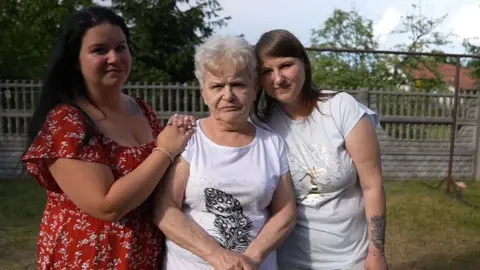
Halina’s smile fades as she remembers visiting her beloved daughter after the crash.
“I wanted her to speak to me,” Halina says, adding: “I was telling her ‘my little daughter please say something to me’ but she never spoke.
“However, I heard her laughter. I would talk to her and tell her stories about the old times.
“I would joke with her and she would laugh, but she could never talk.”
 Getty Images
Getty ImagesThe man responsible for silencing Monika was 33-year-old Lewis Heslop.
He was three-times the drink-drive limit when, on 13 June 2016, he took a friend’s car and raced it around Darlington before crashing into Monika in Easson Road.
He was jailed for four years after admitting causing injury by dangerous driving and driving with excess alcohol.
Helsop was already banned from driving because of a drug-driving offence and the town’s police said he was well-known to them.
In June 2022, six years after the devastating crash, Monika died.
She was 47 years old.
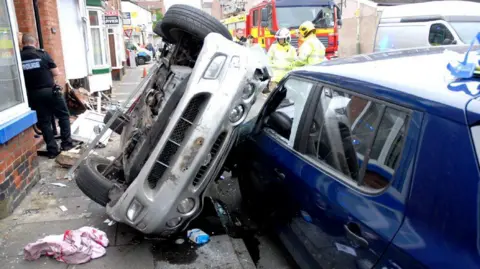 Durham Police
Durham PoliceIt was a stormy summer afternoon when the phone rang at Det Con Natalie Horner’s desk in Durham Police’s headquarters.
“It was the coroner’s officer at Sunderland asking if anyone in the office knew anything about a lady who might have been involved in a collision back in 2016,” she says.
Natalie had led the investigation which saw Heslop jailed, but it was pure chance the call about Monika’s death in a Sunderland hospital came through to her.
Helsop’s jail term never felt sufficient to Natalie and her colleagues, so when she took the coroner’s call she saw an opportunity to revisit the case.
“My initial instinct was we need to investigate it,” Natalie says, adding: “If she has died as a result of that collision this is now a death by dangerous driving.
“We might be a number of years on but we are not going to ignore it. I needed to know whether Monika died as a result of that crash”.
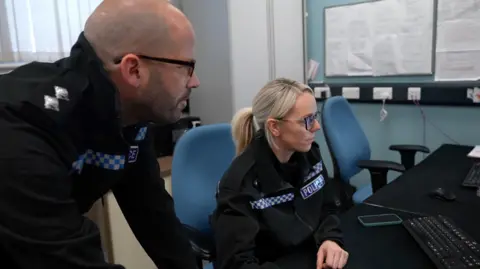
Insp Kevin Salter says Natalie was determined to get Heslop back to court and “ensure justice was done for Monika”.
“I was very sceptical about whether we could do that,” he says, adding: “This was something that had never been done before or even attempted.
“Mr Helsop had served his sentence and was back out on the streets living his life.
“This was a very unique and rare situation but we were determined to try.”
They enlisted the support of the Crown Prosecution Service and lawyer Laura Johnson.
Because Heslop had already been prosecuted over the “same set of circumstances”, to go after him again required the consent of the Attorney General, Ms Johnson said.
Permission was granted but only if prosecutors could prove that the crash six years before had directly caused Monika’s death.
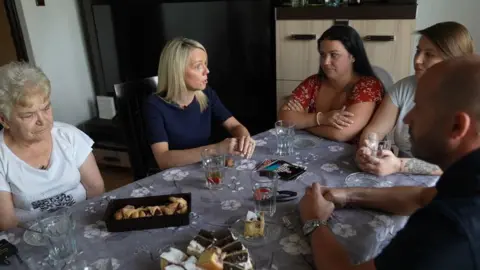
They also had to go back to Monika’s family and sensitively explain how her brain would have to be examined.
“It helped a lot,” her daughter Paulina, 26, says, adding: “It hardly ever happens that somebody should care so much as to make sure this man is brought to justice and punished to face the consequences of his actions.”
Consultant neuropathologist Daniel Du Plessis carried out the intricate examination and he had no doubt Monika’s death was as a result of the crash.
“The chain of causation is very clear between the massive head injuries that she sustained in 2016 and her eventual death,” Dr Du Plessis says, adding: “It starts with massive brain trauma which she survives but in a severely disabled state.”
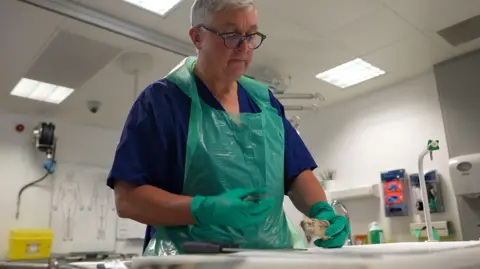
He says Monika’s injuries left her susceptible to infections and, given her age and fitness at the time of the crash, there was “no reason” for her to die when she did.
“The eventual death due to an underlying infection was a direct result from her having sustained massive debilitating brain injuries,” Dr Du Plessis adds.
Heslop was already back in prison by the time Monika died after committing more offences including shop lifting and possessing a knife.
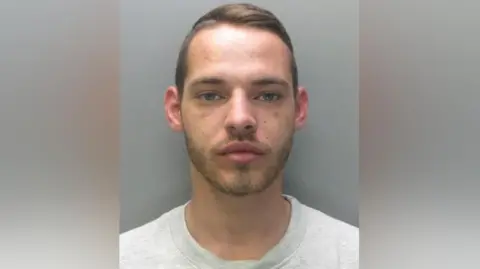 Durham Police
Durham PoliceHe was told in his cell that he would be prosecuted again for Monika’s crash and, in the face of the overwhelming evidence, admitted causing death by dangerous driving.
“Monika didn’t deserve what happened to her,” Natalie says, adding: “She isn’t here to fight her corner, she never has been.
“We are here to fight for her.”
In May, Heslop was jailed for a further three years and 11 months, Monika’s family watching the Teesside Crown Court hearing from Poland via video link.
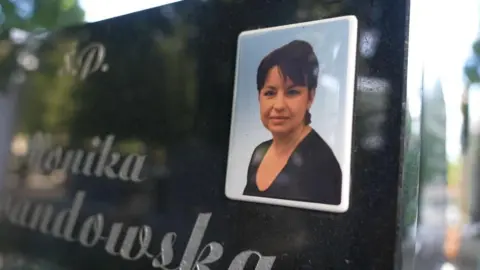
No sentence will ever be enough for them.
“This is the worst thing that can happen to you, to bury your own child,” Halina says.
“I would tell him he took away the most precious thing a mother can have.”
Angelica and Paulina, who have both now had children who will never get to know their grandmother, agree with Halina.
“The pain of losing my mother has been unbearable,” Paulina says.
“I think it will always stay with me.”
Follow BBC Tees on X (formerly Twitter), Facebook and Instagram. Send your story ideas to northeastandcumbria@bbc.co.uk.




